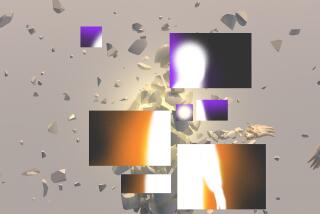Addicted to Love? Blame It on an Intoxicating Jolt of Chemistry
Romantic attraction is often described as a mysterious chemistry, a storm of electrified feelings that occurs when one’s vision of loveliness or hunkiness stands near. Flutters erupt in the belly. The heartbeat quickens. Adrenaline rushes to the bloodstream. Hallucinogenic feelings of intoxication drench the brain.
Call it a natural high, but like drugs, the feeling can become addictive.
During the opening stages of romance and subsequent infatuation, the brain is awash in drug-like chemicals. Michael Liebowitz, a psychiatrist at the New York State Psychiatric Institute, theorizes that there is a substance in the brain called phenylethylamine, or PEA, which quickens the flow of information between nerve cells. PEA is the body’s natural speed: It jolts lovers’ brains with feelings of euphoria, elation and exhilaration, and enough energy to stay up into the wee hours talking, making love or gazing rapturously into each other’s eyes. Liebowitz speculates that some people--those he refers to as “attraction junkies”--are addicted to PEA just as addicts are to speed.
In his groundbreaking, 1983 book, “The Chemistry of Love” (Little, Brown), Liebowitz writes about a young, bright, attractive woman who repeatedly fell in love: “Ms. X saw romance as a ‘quick fix,’ something that could be counted on to make her feel happy and elated. . . . She would meet someone and if the ‘chemistry’ was right, she’d fall in love. Then at least for a while she would feel terrific.”
The drive for love can cause attraction junkies to make bad choices (like amphetamine users, attraction junkies often exhibit bad judgment, Liebowitz notes). And it can impede their ability to move beyond the “amphetamine-like high” of the beginning phase of romance.
Eventually, relationships fall apart. Plunged into gut-wrenching despair and depression, attraction junkies seek a cure in new love. This rocketing from high to low is driven by a craving for PEA, speculates Liebowitz, and is fueled by a chemical imbalance in the brain.
Liebowitz tested his theory by giving some attraction junkies antidepressants that chemically diminished PEA and other neurotransmitters. He found that patients could make calm, rational romantic choices when the PEA craving was gone.
*
But it may be more than a chemical imbalance that fuels the perpetual love-seeking of attraction junkies. Arthur Aron, a social psychologist at the State University of New York at Stonybrook, said that the people most susceptible to infatuation addiction are those who never formed secure, healthy bonds to their caregivers in infancy and childhood. Roughly 10% of people have what is called “ambivalent-attachment” style: they want to be close to people, but don’t feel people want to be as close as they’d like to be. “They are the most likely to fall in love intensely because they are desperate for closeness,” said Aron, an expert on the psychology of attraction. But, because their childhood caregivers were inconsistent, “they have learned to grasp for love but not to depend on it.”
Low self-esteem could also fuel the quest for love. “People with low self-esteem are seeking relationships but . . . they really don’t trust the other person’s reciprocation,” said Aron. “When the other person thinks well of them, they just don’t believe it.”
In a healthy relationship, infatuation wanes (along with the PEA, according to Liebowitz). Well-adjusted couples trade the wild excitement of that period for the calm security of attachment, which in turn triggers the brain to release opiate-like, anxiety-reducing endorphins. Paradoxically, this is when couples experience a radical drop in cuddling, nuzzling and sex but gain benefits such as a healthier psyche, a better functioning heart and a fortified immune system, said researcher Cindy Hazan, professor of human development at Cornell University.
As Liebowitz puts it: “If you want a situation where you and your long-term partner can still get very excited about each other, you will have to work on it, because in some ways, you are bucking a biological tide.”
*
Birds & Bees is a weekly column on relationships and sexuality. Kathleen Kelleher can be reached via e-mail at kellehr@gte.net.


